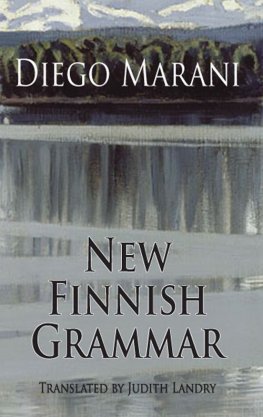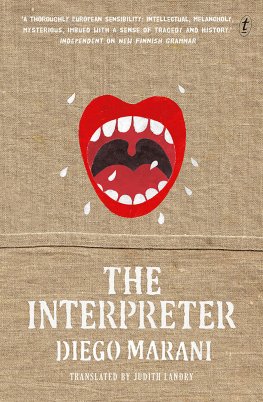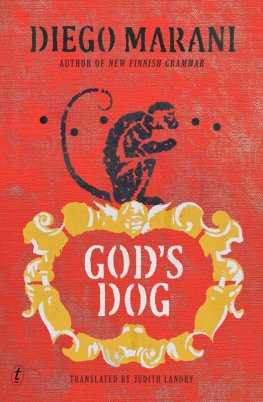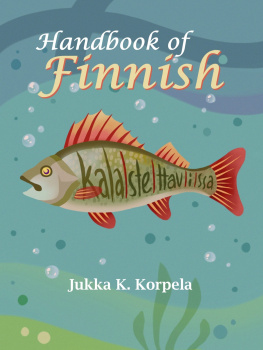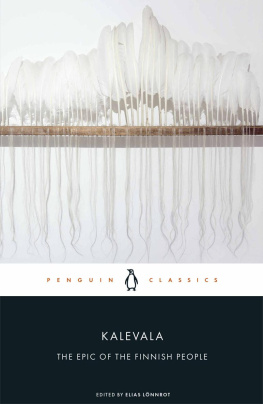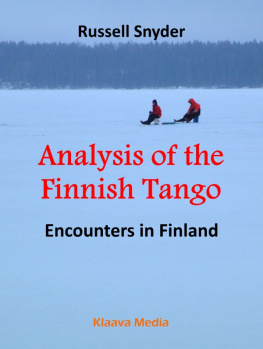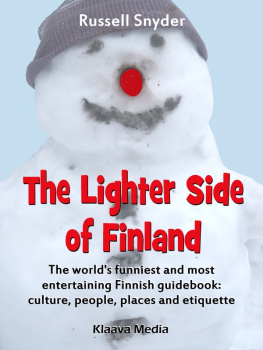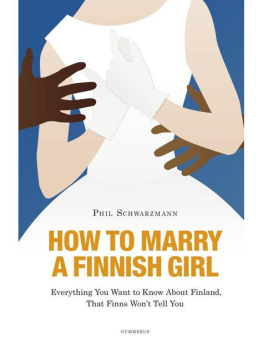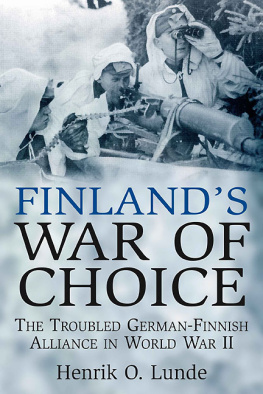Diego Marani
New Finnish Grammar
Praise for New Finnish Grammar
The story of a mysteriously wounded man sent to Helsinki amid the chaos of the second world war to try to rebuild his memory and identity, its a strange, tender portrait of Finnish legends and language-learning, loneliness and human connection.
Justine Jordan Fiction Highlights of 2011 in The Guardian
The title is odd, the cover is grey and the author is a besuited Eurocrat. But beneath these unflamboyant exteriors lie a colourful story. It has taken 10 years, the dedication of a small UK publisher and a perfect-pitch translation to deliver Diego Maranis first novel in English. When it came out in Italian, reviewers called it a masterpiece and it won several prizes. Since then Marani has written five more novels and become a Euro-celebrity.
Rosie Goldsmith in The Independent
a subtle exploration of how language shapes our sense of ourselves
Adrian Turpin in The Financial Times
we soon forget we are reading an English translation of an Italian novel. Sheer narrative vim is one reason for this What gives New Finnish Grammar its true interest, however, is its evocation of a place and language foreign to the author yet, to all appearances, intimately familiar.
Oliver Ready in The Times Literary Supplement
One somehow knows that this couldnt have been written by an English writer. It has a thoroughly European sensibility: intellectual, melancholy, mysterious, imbued with a sense of tragedy and history.
Brandon Robshaw in The Independent on Sunday
Diego Marani ist the parfait persona to tell this story. In his novel, a man wakes up with no memory and is forced to relearn language. And the poor bloke happens to end up in Finland. Finnish grammar is notoriously intricate, counting 15 cases for nouns including one for nouns which are absent. Its an abessive case of amnesia.
Fleur Macdonald in The Spectator
a thoughtful, idiosyncratic book and, in its utter disdain for the conventions of literary realism, entirely to be applauded.
Joanna Kavenna in The Literary Review
There is an unyieldingness at the heart of Diego Maranis novel. He presents a world where heroism is expended in a futile task, friendship is sacrificed to despair, and help is rendered in such a way as to further the disaster. Yet this book is full of riches: a landscape so solidly created one can hear the ice crack, a moving examination of what makes a human being, and a restless brooding over the ideas of memory, belonging and identity (all three main characters are in some way lost). It is written in mirror-smooth prose and superbly translated. The story, finally, cant fail.
Anita Mason in The Warwick Review
As well as raising questions concerning psyche, identity and nationality, Sampos confused agony is quite simply one of the most incisive reflections of the trauma that befell Europe during that period that one might ever read.
Oliver Basciano in ArtReview
the book is beautifully written, poetic and mysterious. It has much philosophical wisdom that will be long remembered after one has read the book.
Rose Lapira in Malta Today
I know that it is a book that I will be thrusting into peoples hands for years to come urging them to buy it, read it and spread the word. It is the least that I can do for the pleasure that it has given me.
Broad Conversation from Blackwells Bookshop in Oxford
Diego Marani was born in Ferrara in 1959. He works as a senior linguist for the European Union in Brussels.
Every week he writes a column for a Swiss newspaper about current affairs in Europanto, a language that he has invented.
His collection of short stories in Europanto, Las Adventures des Inspector Cabillot, will be published by Dedalus in May 2012 at the same time as his second novel, The Last of the Vostyachs.
His most recent novel Il Cane di Dio will be published in Italy in 2012 and by Dedalus in 2013.
The Translator
Judith Landry was educated at Somerville College, Oxford where she obtained a first class honours degree in French and Italian. She combines a career as a translator of works of fiction, art and architecture with part-time teaching.
Her translations for Dedalus are: New Finnish Grammar by Diego Marani, The House by the Medlar Tree by Giovanni Verga, The Devil in Love by Jacques Cazotte, Prague Noir: The Weeping Woman on the Streets of Prague by Sylvie Germain and Smarra & Trilby by Charles Nodier.
To Simona, Alessandro and Elisabetta
Ei Suomi ole mikn kieli, se on tapa istua penkin pss karvat korvilla.
Paavo Haavikko
My name is Petri Friari, I live at no. 16 Kaiser-Wilhelmstrasse, Hamburg and I work as a neurologist at the citys university hospital.
I found this manuscript on 24 January 1946 in a trunk in the military hospital in Helsinki, together with a sailors jacket, a handkerchief with the letters S.K. embroidered on it, three letters, a volume of the Kalevala and an empty bottle of koskenkorva. It is written in a spare, indeed broken and often ungrammatical Finnish, in a school notebook where pages of prose alternate with lists of verbs, exercises in Finnish grammar and bits cut out from the Helsinki telephone directory. Some pages are illegible, others contain just sequences of words without any apparent logic, drawings, foreign names, and headlines taken from the Helsingin Sanomat. Often the narrative proceeds by way of scraps cut out from newspapers, repeated each time a similar situation occurs, and fleshed out by others, in a wide variety of linguistic registers. My knowledge of the facts which lay behind this document has enabled me to reconstruct the story that it tells, to rewrite it in more orthodox language and to fill in some of the gaps. I myself have often had to intervene, adding linking passages of my own to tie up unrelated episodes. Adjectives left in the margins, nouns doggedly declined in the more complex cases of the Finnish language, all traced the outlines of a story which was well-known to me. In this way I have been able to coax these pages to yield up something that they were struggling in vain to tell. Using the scalpel of memory, I carved out words which ached like wounds I had believed to be long healed. Since I bore witness to many of the events and conversations recorded here, I have been able to piece them accurately together. In this I was greatly helped by Miss Ilma Koivisto, a nurse in the military medical corps who, like myself, was personally acquainted with the author of these pages.
The reader should not take this document as a reliable account of historical events, nor expect it to obey the laws of scientific observation. All it does is to tell one incredible human story. Twenty-eight years after having fled Helsinki, I had gone back, my sole reason being to track down the man who, as a result of a cruel misunderstanding on my part, had been unintentionally driven towards a fate which was not his own. But all that remains of him is this exercise book. Plagued with remorse, I set myself to unpicking the jumbled skein of this manuscript, feeling that the least I could do was to honour its writer by ensuring that he was remembered, and also perhaps to reconstruct my own story, my own identity, through other eyes. But it was many years before I could bring myself to offer these pages to the public (together with the annotations I added at the time), before they vanished, and me with them, once and for all. If there is no denying that it was my error which led the author of this manuscript to his tragic end, may I not at least plead the exceptional nature of the times as some excuse? The extreme uncertainty of those wartime days, when I was surrounded by death and suffering, caused muddled emotion to prevail over lucid reason, despite the fact that reason has so often served me well. At times, fate makes us the instrument of its designs, dragoons us into becoming unwitting accomplices in its savagery. Like this man, I too am an exile. But while he felt affection and gratitude for Finland, I have unfinished business with this country. Throughout all these years, I have tried to suppress my hatred for whoever it was who killed my father. Resisting the siren call of revenge, I have always sought to cherish the memory of the country which, after all, is still my own; I have kept up and cultivated my language, making each word a prayer with which I hoped to seek forgiveness for my father and, for myself, the promise of return.

